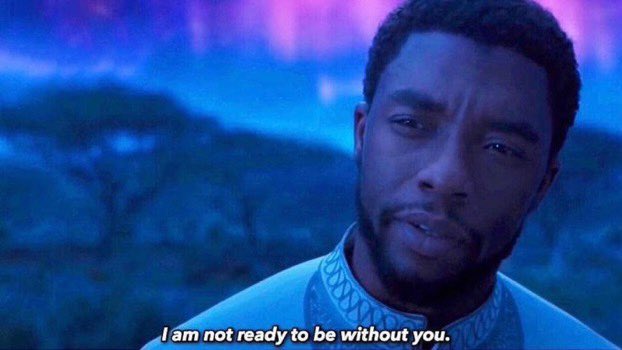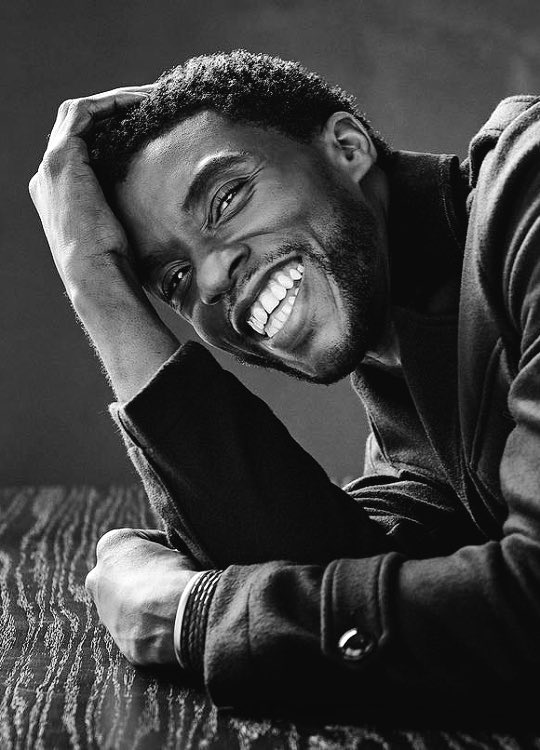
Film still of Chadwick Boseman from Marvel’s Black Panther. Included under fair use.
Last night, on August 28, 2020, the world received the news: The king of Wakanda is dead. Chadwick Boseman has died of colon cancer at age 43.
I was surprised, and then not surprised at all, to find myself in tears.
I worked in an afterschool program for many years, where I taught a weekly superhero club to kids in fourth and fifth grade. In the first few years of superhero club, we spent a lot of time talking about diversity in comics. I taught kids to look for Black superheroes in comics because there were no Black superheroes on the big screen. Some kids even wrote letters to Marvel to try and change this (although I don’t think we ever sent them).
For years, this was my curriculum. We celebrated Black superheroes in comics, even while we did not have the pleasure of seeing them on screen. Then, one year, Black Panther came out. And it was such a joy to be a superhero nerd working with kids at that moment. This was for us. It was for every kid who had never been given the chance to imagine a Black person being so unapologetically powerful. It was for every kid who read comics looking for a superhero they could see themselves in. But most importantly, it was for Black people. Black children had a superhero. I had a superhero.
There’s been a lot of very fair critique about the performative nature of representation. Diverse movies cannot solve the systemic problems Black people face. Some have argued that Black Panther’s depiction of Africa was problematic or harmful. As an academic, I recognize and appreciate the validity of these critiques. As a superhero nerd, Afro-Rican woman, and educator of small children? I can say that when Black Panther came out, none of that mattered. That moment was just joy. Pure and unfettered delight. And that was exactly what it was meant to be.
Theatres across the country were filled with Black people in their Wakanda best for the premiere of Black Panther. There would be no shushing in these theatres. Black Panther was for us. We were going to be loud about it.

Chadwick Boseman. Photo provided by his estate / Twitter @chadwickboseman
Chadwick Boseman spent his career making movies for and about Black people. His impressive line of film credits includes important and iconic Black historical figures, such as Jackie Robinson in 42, James Brown in Get on Up, and Thurgood Marshall in Marshall. He was a South Carolina native and a Howard alum.
Most of us didn’t know him personally. But Black people knew that he loved us. His untimely death is a blow following a year of so many blows. Many of us are finding ourselves grieving his loss more deeply and intensely than we could have imagined.
His death has arrived on top of so much collective grieving this year. Black people are overrepresented in the coronavirus death tolls, due to the effects of medical racism, environmental racism, and other systemic and structural vulnerabilities. Many of us have lost family members. This year has seen skyrocketing visibility of police brutality; extrajudicial murders of Black people keep hitting headlines and we have mourned them all. Breonna Taylor. George Floyd. Elijah McClain. Jacob Blake. And so many more. It seems that this is a year that cannot stop taking from us.
We grieve for Boseman along with our own dead.
I find myself aching, thinking of all the young, Black superheroes worldwide learning this morning that the king of Wakanda is dead. I find myself wondering how much more we can bear. I find myself wondering what will happen when this cup spills over.
This is not a tidy obituary. This is a song of grief. We are tired. I am tired. I don’t even know what to say anymore. I want to stop swimming in this sea of Black death.
I want our Black Panther back.
Chadwick Boseman’s relentless commitment to creating art for Black people was a gift. Even in the throes of his battle with cancer, he remained committed to this work. Where did he find the strength? How did he keep going?
In his 2018 commencement address at Howard University, Chadwick Boseman said, “Everything that you fought for was not for yourself, it was for those who came after you.” He lived that. That is his legacy.
So we must keep going to honor that same legacy. We fight for those who came after us.
Rest in power, Chadwick Boseman.
 NOLAbeings
Multimedia artist Claire Bangser created NOLAbeings as a portrait-based story project that marries...
NOLAbeings
Multimedia artist Claire Bangser created NOLAbeings as a portrait-based story project that marries...
 Data corner: Adobe Suite (create a PDF, social media graphic, presentation, edit a photo and video
Data corner is where you go to work with analytics and top tech skills. It takes on everything from PERL and SQL to Canva and Sprout Social.
Data corner: Adobe Suite (create a PDF, social media graphic, presentation, edit a photo and video
Data corner is where you go to work with analytics and top tech skills. It takes on everything from PERL and SQL to Canva and Sprout Social.
